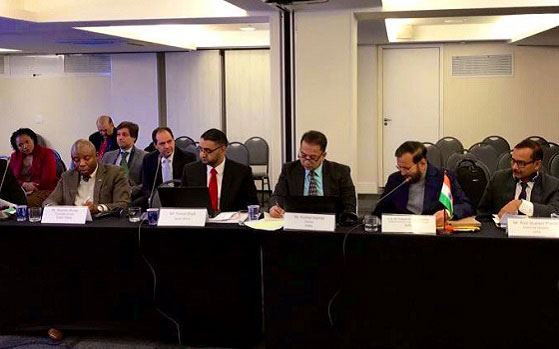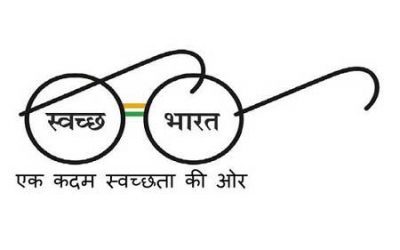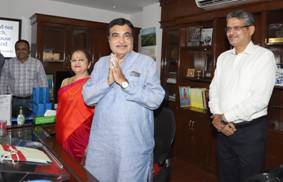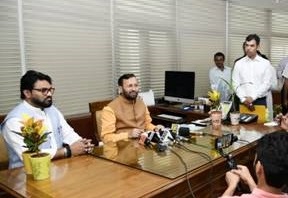Acknowledging the importance of urban environmental management for improving quality of life in cities, the Environment Ministers of BRICS countries today, agreed to work together to resolve the multifaceted environmental issues faced by BRICS cities. These discussions and announcements were made during the 5th BRICS Minister of Environment Meeting held in Sao Paulo, Brazil. This meeting was preceded by two-days meeting of BRICS Joint Working Group on Environment, said a PIB release.
Highlighting the path breaking work done by India in achieving its Nationally Determined Contributions (NDCs) Union Environment Minister Prakash Javadekar said that India was walking the talk on NDCs. “We have achieved reducing energy intensity by 25% and already 78GW of renewable energy has been made possible, while at the same time forest cover has increased by nearly 15,000 sq km and tree cover outside the forest is increasing rapidly,” he said.
Stressing the key role played by BRICS countries Javadekar said that BRICS is a very good platform for all five countries for co-operation and development. “All five countries are rising and have many experiences to share and these experiences will definitely help all the economies to improve further in our climate action efforts and protecting environment while ensuring growth at the same time,” he added. In a tail of ministerial meetings, the minister iterated that India has set an example in achieving its NDCs and all countries need to walk the talk.

Group photo of BRICS Ministers of Environment during the 5th Ministerial meeting in São Paulo. (Source: PIB)
The Ministerial Declaration highlighted key initiatives – Partnership on Urban Environmental Sustainability Initiative (PUESI) to share knowledge and experience on important issues as waste management, cogeneration, reverse logistics, sanitation, urban air quality, urban green areas, BRICS Environmentally Sound Technology (BEST) Cooperation Platform for innovations, knowledge sharing and capacity building, and Clean River of BRICS program for improvement of river ecology and combating marine litter. Environment Ministers agreed to establish and strengthen concrete mechanisms of implementation of the cooperation initiatives with special focus on action-oriented cooperation. The key themes of urban environmental management, contaminated areas and soil remediation, water quality, circular economy in context of sustainable consumption and production, marine litter and biodiversity were agreed to be integrated into BRICS cooperation initiatives.
Javadekar, applauded the initiatives of BRICS countries and reaffirmed India’s support to BRICS cooperation. Environment Minister highlighted key initiatives as Swachh Bharat Mission, Waste Management Rules, Nationally Determined Contributions under Paris Agreement, National Clean Air Programme, electric mobility, marine litter, urban forestry scheme, development of resource efficiency policy among others. These efforts and innovative solutions for improving urban environmental quality were well acknowledged by the BRICS countries.
With respect to biodiversity, BRICs countries stand committed to support the development of Post-2020 Global Biodiversity Framework and expect the prospective framework to acknowledge the sustainable use of biodiversity and Access and Benefit Sharing components.
The Ministers of BRICS countries urged developed countries to fulfill their commitment under the UNFCC and its Kyoto Protocol and Paris Agreement to provide means of implementation to developing countries including climate finance, technology development and transfer and capacity building support. BRICS countries reaffirmed the importance of jointly exploring new sources of financing individual, bilateral and multilateral projects, while highlighting access to financial resources as key to tackling environmental problems in the developing world.
BRICS countries appreciated the Indian Presidency of the fourteenth session of the Conference of Parties of the United Nations Convention to Combat Desertification. Javadekar invited the BRICS Ministers delegations to join at CoP-14 during 2–13 September, 2019 and contribute to the efforts to combat desertification and land degradation.
Brazil was led by Ricardo Salles, Minister of Environment. Minister of Natural Resources and Environment. Dmitry Kobylkin led the Russian delegation, while the Chinese delegation was led by Huang Runqiu, Vice-Minister of Ecology and Environment and the South African delegation was led by Minister of Environment, Forestry and Fisheries, Barbara Creecy.
Pix Source: PIB.














0 Comments